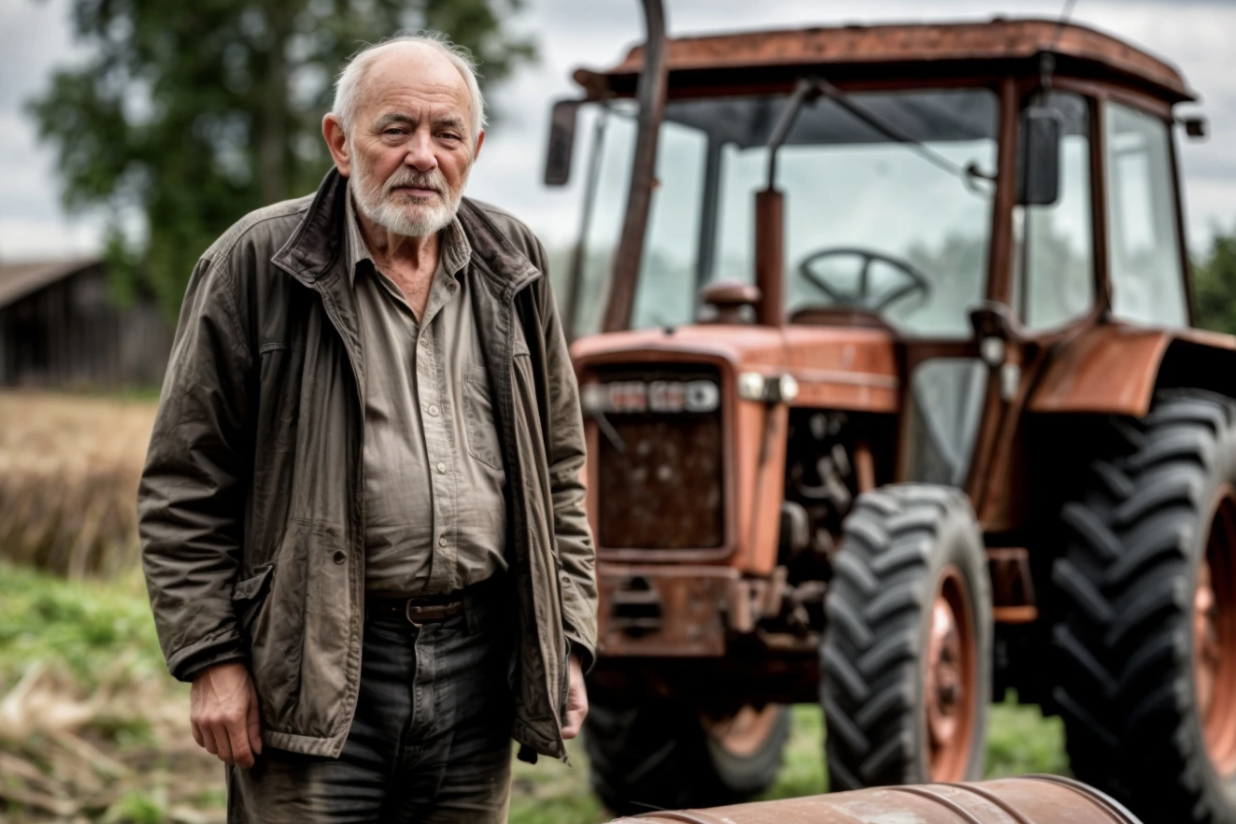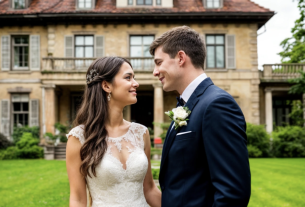Deep in an old village, lost among endless fields and whispering pines, stood a house with peeling paint and a roof slightly sagging under the weight of time. In this house, like a root grown deep into the earth, lived Zakhar Mikhailovich for seven decades — a man whose soul was filled with silence, wisdom, and unspoken words of love. He had spent forty years of his life alongside Maria — a woman whose name sounded on his lips like a prayer, whose presence was warmth in every corner of their modest home. A year ago, she passed away, leaving behind a void that nothing could fill.
Her funeral marked the end of one world for him and the beginning of another — a world of loneliness, where every morning began with a heavy sigh, and every evening ended by the window, where he looked at the sunset as if trying to see her face in the clouds. He almost stopped leaving the house, going out only on Saturdays, like a wound-up mechanism, to the cemetery — not just to remember, but to talk, to tell how the day went, what he remembered, what he dreamed of. There, by the modest cross covered with moss and rain, he felt she was listening.
“Maria, my dear,” he whispered, touching the cold stone with a trembling hand, “I’ll go to the city on Saturday. It’s time to put up a monument for you. A worthy one. As you deserve. I promised — you’ll have a beautiful little house in eternity. But for now… I’ll be back soon. Very soon.”
Their dream of having children remained just a dream. In those days, when medicine still could not perform miracles, they visited doctors, hoped, prayed. But it didn’t work out. They wanted to adopt a child from an orphanage — their hearts were open, their arms ready to embrace. However, officials deemed them too old, too poor, too… unsuitable. Fate, as if mocking them, closed the door, leaving only emptiness in the house and in their hearts.
The house became a stranger. Every object — a cup, a tablecloth, an old scarf draped over a chair back — reminded him of her. Within these walls there were no more footsteps, no voice, no laughter. Only tears, which the old man no longer hid, streamed down his wrinkled cheeks as he sat by the fireplace, staring into the flames as if trying to see her face there.
But in this sorrow appeared a ray of light — an eight-year-old boy named Danil. A neighbor’s child, with tousled hair and eyes full of childlike curiosity, who often visited the old man. He was not afraid of his silence, did not turn away from his sadness — he felt that here, at Grandpa Zakhar’s place, he could be himself. And the old man, in turn, came alive in his presence. He told him about his childhood — about homemade sleds, school bells, the war he knew from his father’s stories, and how he first fell in love with Masha while standing by the well with a bucket.
One day Danil came with his head down, eyes shadowed by fear.
“What happened, boy?” Zakhar asked, pulling him close. “Who hurt you?”
“Mom… stepdad hit her again,” Danil whispered, clenching his fists. “I was sitting in the garden, listening to them yelling… I couldn’t go in.”
The old man felt a flare of anger in his chest. He could not remain silent. He could not watch a small person suffer.
“Tomorrow I’ll go to the local officer,” he said firmly. “This isn’t life. It’s a disgrace. And you, little one, hang in there. Want some sweets? I’ll bring you candy, cookies, just like you like.”
“No, grandpa,” the boy whispered. “I only want Mom to be okay.”
Zakhar squeezed his hand. At that moment he realized: he was not just an old man, he was a protector. Even if he had no strength, even if he was old, he had to stand up for those in need.
The next day he went down to the basement — where memories, old things, and a single bundle wrapped in cloth were stored. His hands trembled as he took it out.
“What’s this, grandpa?” Danil asked, peeking into the basement.
“You’re too young to know,” Zakhar answered with a sad smile. “But maybe one day, I’ll tell you.”
It was gold — ancient nuggets found by Zakhar’s father in distant lands. He hadn’t sold them for years, keeping them as his last treasure. But now he understood: the time had come. He took them to the city, to a pawnshop, and with the money ordered a monument for Maria — granite, engraved with her name and dates, with an angel spreading wings over her eternal sleep.
On the way back, he stopped by the local officer, Pavel Dmitrievich.
“Something must be done about this man,” he said, clenching his fists. “If the boy sees his mother beaten every day, what will he become? A beast? A coward? I cannot sit idly by. Take action, and if you don’t — I’ll handle it myself.”
His words did not go unnoticed. That very night, Sasha, Danil’s stepfather, was arrested for domestic violence. For 15 days. He begged, swore he wouldn’t drink again, that he would work, care. But Nina — Danil’s mother — only shook her head.
“I’m tired,” she said. “I want my son to live at least half a month in peace.”
When Zakhar came to her, he looked at her with pain.
“How do you put up with him?” he asked. “He’s destroying you.”
“Uncle Zakhar,” she whispered, “when he’s sober… he’s kind. And I’m sick. Diabetes. I can’t lift Danil myself. At least he brings money.”
“Leave him,” the old man said firmly. “Strength will come. And I’ll help. Maybe you’ll meet a real man. A worthy father for your son.”
A few days later, returning from the cemetery, Zakhar heard a faint, plaintive whimpering. Looking back, he saw a tiny puppy shivering from cold and fear in a ditch. It seemed to have been abandoned. The old man picked it up, held it to his chest, warmed it with his breath. Took it home, fed it, covered it with a scarf.
The next day he knocked on Nina’s door.
“Ninusya, will you let Danil have a dog? He’s been dreaming of a puppy.”
“Of course,” she smiled. “But he must take care of it.”
Within half a minute Danil burst out onto the porch like a hurricane. Seeing the puppy, he froze, then broke into a happy smile.
“Wow! Is he mine?” he shouted.
“Yours,” Zakhar said, handing over the little one. “Now you have a friend.”
Two years passed. Danil grew. The dog — now grown and faithful — was his shadow. But the joy was overshadowed — the boy’s mother was wasting away. Diabetes consumed her. Doctors shrugged helplessly. When Nina died, Danil’s world collapsed.
Sasha, the stepfather, remained. But he drank every day. The house turned into a dump — filth, cockroaches, the smell of alcohol. Danil came to Grandpa Zakhar more and more often, begging:
“Take me to live with you! Please!”
“Oh, grandson,” the old man said bitterly, “I would give my life for that. But the guardianship authorities… they won’t give a child to an old man. They say a young family is needed to provide a future.”
But Zakhar did not give up. He went to social services, wrote applications, begged. Yet Danil was still sent to an orphanage. The old man achieved only one thing — the right to see him on weekends. Every Saturday he came, took his grandson, and they went into the forest, fishing, visiting friends. The dog ran beside them, a symbol of loyalty and love.
One day Sasha died — fell asleep drunk without putting out a cigarette. The fire took him. Soon after, three young men came to Zakhar’s house.
“We hear you’ve got gold? Share it?” one asked with a smirk.
“We did,” the old man calmly replied. “Sold it. For my wife’s monument.”
“We’ll see!” another shouted. They turned the house upside down but found nothing. Left empty-handed.
Years passed. Danil grew. Zakhar aged. And one day, during a visit, the old man quietly said:
“My time is coming, grandson. I won’t make it. I’ve bequeathed the house to you. It’s old, but it’s yours. And I will leave peacefully.”
“No, grandpa!” Danil shouted, crying. “I don’t want to lose you!”
“You will live,” Zakhar smiled. “You’ll start a family. And the house… maybe you’ll sell it and buy something better.”
Danil grew strong, handsome, kind. In the village, he met Olesya. They fell in love. But her parents were against it.
“He’s poor! What can he give you?” they shouted.
“I love him!” Olesya cried. “We can manage!”
Danil suffered. He felt worthless. But on his eighteenth birthday, the chairman summoned him. In his hands was his grandfather Zakhar’s will.
It said: “Go to the old oak by the forest. There, under the roots, I buried a barrel of gold. Sell it. Start your business. Live happily.”
Danil found the treasure. He was stunned. He told Olesya. Her parents, learning the groom had an inheritance, instantly approved the marriage.
The newlyweds opened a farm. A year later they had a son. They placed granite monuments for Grandpa Zakhar and his wife Maria. They cared for the graves like a shrine.
“Thank you, grandpa,” Danil whispered, standing at the grave. “You gave us everything. Now we are happy.”
And in the silence of the village, among the rustling leaves and the dog’s barking, it seemed that somewhere in the clouds two old souls smiled — Zakhar and Maria — knowing their love continues.



